Happy Valentine's Day! May your life be blessed with love. And may the love you share be returned to you a hundred-fold. This is the month of hearts and I declare it the month of the cabbage 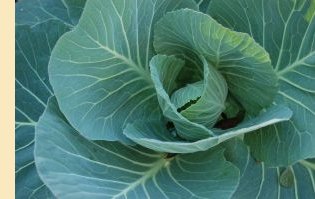 family, too. Why? Because all the plants in this large family love frost, are available in February, are easy to identify, are dependably edible, and provide major medicines as well. I love you cabbage family! family, too. Why? Because all the plants in this large family love frost, are available in February, are easy to identify, are dependably edible, and provide major medicines as well. I love you cabbage family! Wild members of the cabbage family – like garlic mustard and Barbara's cress (see photos in last week's green report) – are easy to find and ready to eat right now. In the next two weeks we will focus on some delicious ways to utilize garlic mustard; this month let's explore the tame members of the cabbage family. 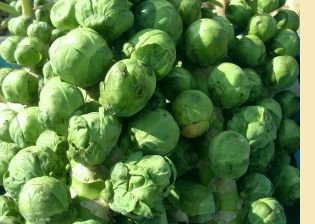 Thousands of years ago, clever women genetically modified one wild plant to produce the many cabbage family plants we grow today including broccoli, cauliflower, kale, collards, Brussel sprouts and the many kinds of cabbage. Yes! These are all really just one plant! Other cultivated cabbage family plants include mustard (greens and seeds), radishes, arugula, bok choy, turnips, rutabaga, kohlrabi, broccoli de rappi, and horseradish. Thousands of years ago, clever women genetically modified one wild plant to produce the many cabbage family plants we grow today including broccoli, cauliflower, kale, collards, Brussel sprouts and the many kinds of cabbage. Yes! These are all really just one plant! Other cultivated cabbage family plants include mustard (greens and seeds), radishes, arugula, bok choy, turnips, rutabaga, kohlrabi, broccoli de rappi, and horseradish.
The cabbage family provides more greens and vegetables than any other family. And every member, cultivated or wild, is loaded with vitamins, minerals, anti-oxidants, and cancer-preventative substances. Scientific studies confirm that eating as little as four servings of cabbage family plants a week reduces overall cancer risk by fifty percent!! Don't like calling it the cabbage family? You can call it the mustard family. Gardeners call them cole crops or brassicasias (bra-suh-case-ee-ahs) and to the botanist they constitute the Brassicaceae (formerly Cruciferae) family. Your two tasks for this week: - Grow some cabbage family plant
- And learn to cook kale and collards.
Buy seeds of any cabbage family plant and plant them right now in a pot, in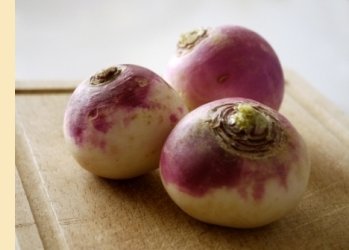 your coldframe, in your garden, or in your greenhouse. Really! The seeds will sprout when they decide it is warm enough, so go ahead and plant them as soon as you can. Cabbage family seeds germinate best in cold or cool soils. your coldframe, in your garden, or in your greenhouse. Really! The seeds will sprout when they decide it is warm enough, so go ahead and plant them as soon as you can. Cabbage family seeds germinate best in cold or cool soils. Buy a nice bunch of collards or kale from your favorite market. (Remember, they sneer at cold, so weren't affected by the recent frosts in California and Florida.) My local supermarket offers both. Remove the large central stalk from the kale; leave it on the collards. Rinse the leaves in cold water, then hold the bunch tightly and cut it into 2 inch wide pieces.
Put about one inch of water into a pan big enough to hold your greens and throw the cut kale or collards in. Bring to a boil, stirring now and then. At this point, the greens will have shrunk and ought to be just covered by the water. If not, add enough more to barely cover them.
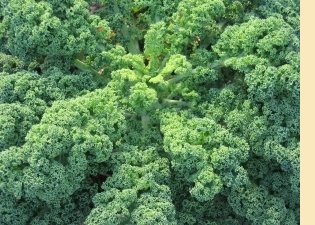 Keep them simmering for at least an hour, checking on the water so it doesn't boil away. Optimum cooking time is really four hours. (I dare you to do it.) Keep them simmering for at least an hour, checking on the water so it doesn't boil away. Optimum cooking time is really four hours. (I dare you to do it.)
Study the differences between short and long cooking of greens by removing a spoonful of greens from your pot every 15-20 minutes. Label your samples with the time and set aside so you can taste and feel into the differences. You will be surprised by the surge of love your body feels for the long-cooked greens.
Long cooking breaks the cell walls of sturdy greens, thus freeing the minerals to be utilized by our bodies, maximizing our ability to convert the carotenes into vitamin A, and it boosting the anti-oxidant content. For even more nutrition, add some fat (like olive oil or bacon drippings), when you eat your kale or collards. I guarantee you will love them this way, and hopefully cook them this way forevermore.
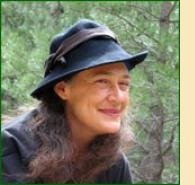
Green blessings, and lots of love to you all.
Susun www.susunweed.com |